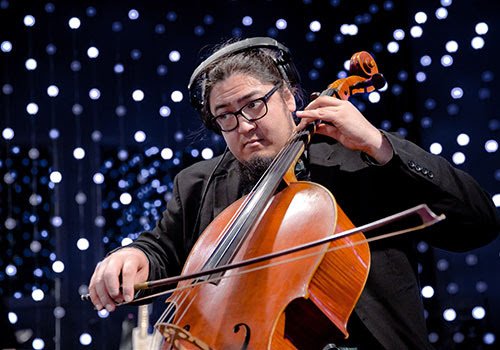Sound Off
In honor of Sunday’s Grammy Awards, this Friday Five is devoted to audio matters.
Will You Please Be Quiet, Please.
It’s a foggy morning in the Western suburbs. With an hour to kill before I stop at my parent’s apartment for a weekly visit, I head to a Corner Bakery for a coffee and a WiFi connection. I sip and type for a few minutes until I realize I’m not alone. Sure, the room is nearly empty—the strip-mall stores down the way won’t open for an hour—but my thoughts are getting elbowed by the Bose speakers that surround me: “Psst….hey you….forget about your email…listen to this song!”
Yes, there is music here, as there is in every public space except libraries and empty churches. Yes, your average pair of ears wouldn’t think of it as “a disturbance.” But, I am a crank and a curmudgeon. I yearn for quiet.
You will say—as many have—”It’s innocuous—not too loud, nothing obtrusive.” The songs are appropriately tuneful and fresh. If I were interested in listening to music while I nibbled at my “overnight oats,” I’d probably enjoy it.
But I am a luddite, I guess, unable to adjust to the sensory “richness” of modern life.
I understand that eating breakfast is no longer just about the bowl of oatmeal in front of me. My $8.49 is buying me a Corner Bakery Experience, complete with the soothing visuals of the restaurant mise-en-scène—warm dark wood and rustic red trim—and the accompanying soundtrack. I sometimes long for the perhaps illusory days-gone-by, when the “experience” of a breakfast joint would involve an unshaven fellow in a stained apron sharing his opinion about the Packers or a coffee-pot-wielding waitress who calls me “hon” or “sugar.”
I once happily reveled in the whitewash of background radio—Top 40 hits and ads that urged me to visit the Great Lakes Dragaway on SUNDAY, SUNDAY, SUNDAY!!! In later years, National Public Radio was as constant and comfy as the green velour reading chair I picked up at an estate sale.
But in my dotage, I prefer one sensory input at a time. Reading at home, I generally have the luxury of silence. If I need “quiet,” I’ll rely on the steady whoosh of the Dohm “noise generator” or even use earbuds and YouTube to envelop my brain in a comforting quilt of white noise. Conversation? Yes please, but let’s go somewhere we don’t have to shout into each other’s ear. Sometimes sounds are beautiful, welcome (see below), but sometimes, to quote the great Raymond Carver, you just want whisper to the world, “Will You Please Be Quiet, Please.”
Frankly Music: Curiosities and Classics
Eugene Drucker
Eugene Drucker has a mantle-full of Grammy’s (a total of nine from 47 years with the Emerson String Quartet), but a week before this year’s ceremony, he decided to hang out with local violin legend Frank Almond in Wauwatosa’s Schwan Concert Hall. They opened Monday’s Frankly Music concert explaining the curiosities of Georg Philip Telemann’s “slightly oddball” musical composition based on Gulliver’s Travels. The composer was a huge fan of Jonathan Swift—Almond called him the original, um, “Swiftie”—and wrote a suite of violin duets inspired by it. They are songs with curious titles (“Wild dance of the untamed Yahoos”) and even curiouser time signatures (the “Brobdingnagische Gigue” is not in 4/4 but in 24/1).
After a lecture-demonstration about these pieces, Drucker and Almond played them flawlessly. Then leapt over a few centuries to play six of Bela Bartok’s duos for two violins, published in 1931 as a series of studies for music students. As Almond pointed out, they still bear Bartok’s passion for Hungarian folk melodies—with their biting sonorities and charged dance rhythms. Drucker traded his violin for a viola and cellist Roberta Cooper joined the pair to play Haydn’s String Trio from 1789. It is typical Haydn—an “orchestration,” actually, of one of his piano sonatas—and the trio found its grace and wit, with Almond stretching out and digging in to the filigrees and ornamentation Haydn adds when he revisits the main themes.
Pianist Marta Aznavoorian joined the trio for the main event, Gabriel Faure’s early and celebrated Piano Quartet in C Minor. I’ve heard it several times, but it’s been a while since I’ve listened closely to the entire piece. So I was surprised when Almond introduced it as “mostly sunny.” It is in a minor key, after all. And the opening motif—which returns again and again through the first movement—is stately and burnished, sunshine perhaps, but a darker, sturm-und-Brahms sort of sunshine. But Faure lets the light and wit pour in during the second movement, a sparkling scherzo full of plucked strings and driving rhythms. In the midsection, the muted strings whisper to accompany the piano’s elegant arpeggios. It was a glowing performance.
Present Music
Paul Wiancko, photo by Charina Pitzel
When silence gets a little boring, I do love me some cello. So this week’s Present Music program, Cello, Cello, was an embarrassment of riches, featuring six pieces by two musician/composers. There is much to say about all six. But I’ll limit myself to two highlights.
Despite his gentle demeanor, Paul Wiancko is a contemporary music heavy hitter. He’s the newest member of the acclaimed Kronos Quartet and was just appointed Director of Chamber Music at the prestigious Spoleto Festival USA. He opened the concert with “When the Night,” a cello quartet variation built on the first three sung notes of Ben E. King’s recording of “Stand By Me” (A-C-D for those of you keeping score at home). Gentle and contemplative at first, it rings with wide open, parallel harmonies that eventually build to a more agitated section. It then gets playful—pizzicato dabbling—before settling again into the lush chords of the opening. Along the way, it explores the full range of the instrument—percussive, lyrical, richly sonorous.
Pamela Z
Pamela Z played four pieces for solo voice and electronics, spanning 30 years of her work. Her “instruments” are her voice, a computer and a group of receivers and sensors that surround her, allowing her to manipulate her voice and other sounds by moving her hands in space in dance-like gestures. She is a one-person orchestra (and chorus). She loops riffs into infectious rhythms that ricochet around the hall (thanks to sound engineer Marty Butorac). She builds edifices of sound, layering tones and textures only to make them vanish with a flick of her wrist.
The program featured other works by each artist, including two world premieres. If you missed the concert, their work is worth exploring via their respective websites.
Top This Mr. Grammy
Aretha Franklin
Thank you Lindsay Zoladz, author of the New York TImes’s newsletter, “The Amplifier,” for making me feel pretty bad about this year’s Grammy Awards. When (if) I sit down to watch this Sunday, I will no doubt smirk and scowl my old fogie scowl at the hype-driven bon homie among the latest batch of musical icons. But Zoladz has given me some hard historical info to arm my skepticism.
Her latest piece focuses on the 1968 Grammy Awards, and wonders (or at least made me wonder) if this year (or years to come) could possible top the 1968 roster of winners. Okay, okay…The Fifth Dimension won Record and Song of the Year for “Up, Up and Away” (over the likes of Leonard Cohen’s “Suzanne” and Aretha Franklin’s “Respect”). But the ‘68 Grammy’s also honored Elvis Presley (his first Grammy for “Crying in the Chapel”), The Beatles’s “Sergeant Pepper,” Johnny Cash and June Carter’s “Jackson,” Sam & Dave’s “Soul Man,” Glen Campbell’s “Gentle on My Mind,” and Aretha’s “Respect” (for Best R&B Recording and Vocal Performance). Quite the list.
But listen for yourself. Click on the links above or breeze through Zoladz’s playlist to relive this banner year in music.
“The Sound”
Speaking of quiet, here’s a poem from Christian Wiman. Unseasonably warm weather here in Wisconsin affords a chance to find your own quiet space.
The Sound
Christian Wiman, photo by Danielle Chapman
A bird sanctuary with no birds.
Eerie the beauty of the empty marsh,
no people even, soft apocalypse
of cordgrass, eelgrass, salt marsh pink,
the first sun refined and rebuffed by the Sound.
It became a game not to make a noise,
to let thoughts live or die in the eyes,
to entice wildness by the pure force of our peace,
Shells went uncrushed, twigs missed, words averted flesh . . .
There was a hint of something then,
almost a call, but so thin it seemed a memory
even as it happened, too vague to name, impossible to follow.
Some part of us remains.
Some part of us pauses still on that path,
with the unpiping piping plover, and the invisible bittern,
and the once common knot.
Have a great week. The Friday Five will return on February 9th.






